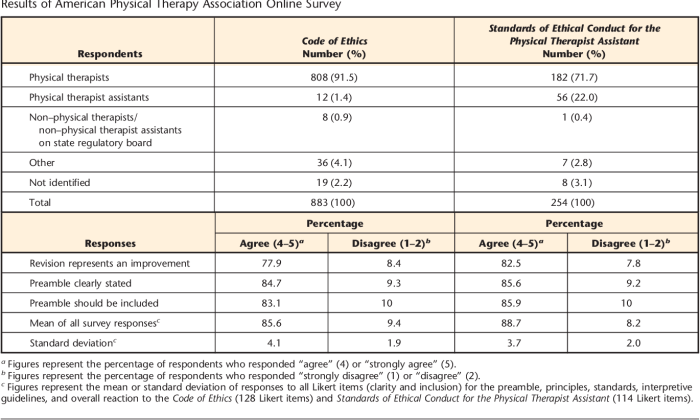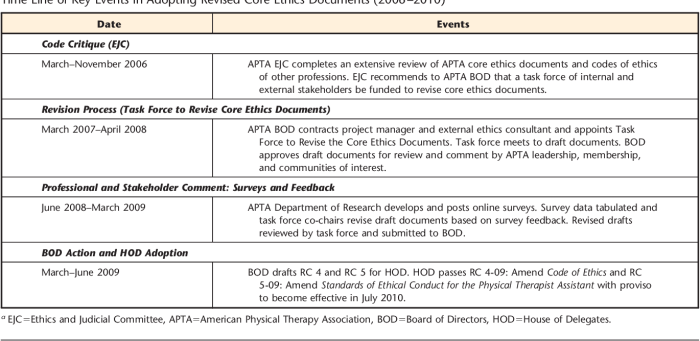Standards of ethical conduct for the physical therapist assistant – The standards of ethical conduct for physical therapist assistants (PTAs) provide a comprehensive framework for guiding ethical decision-making and behavior in the field of physical therapy. These standards are essential for ensuring the well-being of patients, maintaining professional integrity, and upholding the reputation of the profession.
The ethical principles that underpin the standards of conduct include respect for patient autonomy, beneficence, non-maleficence, and justice. PTAs are expected to adhere to these principles in all aspects of their practice, including patient care, documentation, and professional interactions.
1. Introduction
Ethical conduct is the cornerstone of the physical therapy profession. It guides physical therapist assistants (PTAs) in providing safe, effective, and compassionate care to patients. Ethical standards ensure that PTAs adhere to the highest levels of professionalism and maintain the trust of the public.
PTAs have a responsibility to understand and follow ethical guidelines established by professional organizations and regulatory bodies. These standards provide a framework for decision-making and help PTAs navigate complex ethical dilemmas that may arise in their practice.
2. Legal and Regulatory Considerations

PTAs are bound by various laws and regulations that govern their ethical conduct. These include the Health Insurance Portability and Accountability Act (HIPAA), which protects patient privacy; the Americans with Disabilities Act (ADA), which prohibits discrimination against individuals with disabilities; and state licensing laws, which establish minimum standards for practice.
Understanding and complying with these legal and regulatory requirements is essential for PTAs to maintain ethical conduct and avoid potential legal consequences.
3. Professional Organizations and Ethical Guidelines

Professional organizations, such as the American Physical Therapy Association (APTA), play a vital role in promoting ethical conduct among PTAs. APTA has established a Code of Ethics that provides specific guidelines for ethical behavior, including principles related to patient care, professional conduct, and confidentiality.
PTAs are expected to adhere to the APTA Code of Ethics and to participate in continuing education programs that promote ethical decision-making.
4. Ethical Principles

The core ethical principles that guide PTAs include:
- Autonomy: Respecting the patient’s right to make decisions about their own care.
- Beneficence: Acting in the best interests of the patient.
- Non-maleficence: Avoiding harm to the patient.
- Justice: Treating all patients fairly and equitably.
These principles provide a foundation for ethical decision-making and help PTAs balance the competing demands of patient care.
5. Patient Rights and Responsibilities: Standards Of Ethical Conduct For The Physical Therapist Assistant
PTAs have a responsibility to respect the rights of patients, including their right to informed consent, privacy, and confidentiality. PTAs must also educate patients about their responsibilities, such as adhering to treatment plans and providing accurate information about their health.
By understanding and respecting patient rights and responsibilities, PTAs can foster a trusting and collaborative relationship with their patients.
6. Professional Boundaries
Professional boundaries are essential for maintaining ethical conduct. PTAs must avoid any behavior that could be construed as inappropriate or exploitative. This includes maintaining a respectful and professional demeanor, avoiding conflicts of interest, and refraining from engaging in romantic or sexual relationships with patients.
Establishing and maintaining clear professional boundaries helps PTAs protect both themselves and their patients.
Essential FAQs
What are the key ethical principles that guide PTAs?
The key ethical principles that guide PTAs include respect for patient autonomy, beneficence, non-maleficence, and justice.
What is the role of the American Physical Therapy Association (APTA) in promoting ethical conduct?
The APTA plays a vital role in promoting ethical conduct by establishing ethical guidelines, providing educational resources, and advocating for ethical practices.
What are some examples of inappropriate behaviors that cross professional boundaries?
Examples of inappropriate behaviors that cross professional boundaries include engaging in romantic or sexual relationships with patients, accepting gifts of excessive value from patients, or using patient information for personal gain.